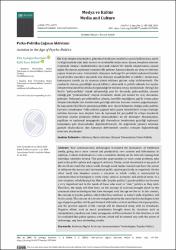Psiko-politika çağının aktivizmi
Citation
Aydoğan Boschele, F., & Bülbül, E. B. (2024). Psiko-politika çağının aktivizmi. Medya ve Kültür. 4(2), 195-208.Abstract
Yeni iletişim teknolojileri, geleneksel medyanın sınırlarını aşarak kullanıcılara, içerik
ve bilgi üzerinde daha fazla kontrol ve üretkenlik imkânı tanır. Ayrıca, bireylerin internet
ortamında bireysel kimliklerinden sıyrılarak kolektif bir kimlik oluşturmasına olanak
sağlar. Bu durum, toplumsal sorunları dile getirme, kamusal alanda yer alma ve aktivizm
yapma fırsatları sunar. Günümüzde, dünyanın herhangi bir yerindeki toplumsal hareket
sosyal medya mecraları sayesinde tüm dünyaya ulaşabilmekte ve kitleleri, uluslararası
kamuoyunu olumlu ya da olumsuz yönde etkileme gücüne sahip olabilmektedir. Öte
yandan bu durum, gerçekliğin sosyal, kültürel, ekonomik ve politik anlamda her açıdan
iletişim teknolojileri tarafından kurgulandığı bir durumu ortaya koymaktadır. Byung Chul
Han’ın “psiko-politika” olarak adlandırdığı yeni bir durumda, psiko-politika, siyaseti
istediği gibi “yönlendirmek” isteyen kesimlerin elinde çok önemli bir araç durumuna
gelmiştir. Dolayısıyla gerçekleştirilen çalışma, öncelikle yaşadığımız çağ ile ortaya çıkan
iletişim teknolojilerinin beraberinde getirdiği aktivizm kavramı üzerine yoğunlaşmıştır.
Bu kapsamda Chul Han'ın günümüz politika tarzı olarak bahsetmiş olduğu psiko-politika
kavramı tartışılmıştır. Psiko-politika çağında bahsi geçen teknolojilerin ortaya koyduğu
aktivizm kavramı hem eleştirel hem de kuramsal bir perspektif ile ortaya konularak
kavramın olumlu yanlarıyla birlikte olumsuzlukları da ele alınmıştır. Manipülasyon,
popülizm ve toplumsal propaganda gibi durumların beraberinde getirdiği toplumsal
kutuplaşma gibi olumsuzluklar değerlendirilmiştir. Bu doğrultuda yalnızca teknoloji
gücüyle oluşturulacak olan kamuoyu aktivizminde yanıltıcı sonuçlar doğurabileceği
sonucuna ulaşılmıştır. New communication technologies transcend the boundaries of traditional
media, giving users more control and productivity over content and information. In
addition, it allows individuals to create a collective identity on the internet, leaving their
individual identities behind. This provides opportunities to voice social problems, take
part in the public sphere and engage in activism. Today, social movements in any part of
the world can reach the whole world through social media channels and have the power
to influence the masses and international public opinion positively or negatively. On the
other hand, this situation reveals a situation in which reality is constructed by
communication technologies in every social, cultural, economic and political sense. In a
new situation, which Byung Chul Han calls “psycho-politics”, psycho-politics has become
a very important tool in the hands of those who want to “steer” politics as they wish.
Therefore, the study will first focus on the concept of activism brought about by the
communication technologies that have emerged with the age we live in. In this context,
the concept of psycho-politics, which Chul Han mentions as today's style of politics, will
be discussed. The concept of activism brought about by the mentioned technologies in the
age of psycho-politics will be put forward with both a critical and theoretical perspective,
and the positive aspects of the concept will be discussed along with its drawbacks.
Negative effects such as social polarization brought about by situations such as
manipulation, populism and social propaganda will be evaluated. In this direction, it will
be concluded that public opinion activism, which will be created only with the power of
technology, may have misleading results.
Source
Medya ve KültürVolume
4Issue
2URI
https://dergipark.org.tr/tr/pub/medkul/issue/88756/1574884https://doi.org/10.60077/medkul.1574884
https://hdl.handle.net/20.500.12780/1015


















